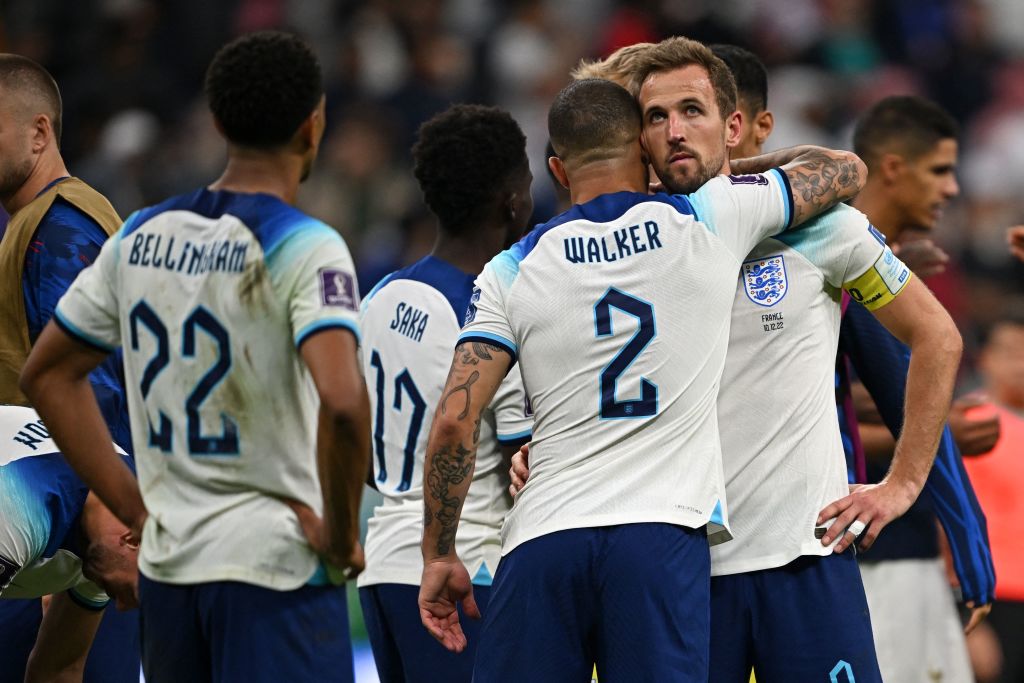I have spent many, many years dutifully squeezing into pubs full of rapt, drinking men giving excessively loud voice to their feelings of either atavistic triumphalism or atavistic rage – all accompanied by the odd rattle of broken glass and flare-ups of intra-man hostility. But last weekend, as I dutifully prepared to leave my warm flat and make my way in the sub-zero night to the pub for the World Cup quarter-final of England versus France, I realised that I am done. Done with football – and done with England.
Well, that’s not entirely accurate. The Women’s Euros final, which saw the Lionesses romp to victory – something their male equivalents haven’t done since 1966 and seem unlikely ever to do in my lifetime – was the first time I have ever enjoyed watching footie. Not only was it fun to see ponytails a-swinging on the pitch, but there was far more continuous play than with the men. The Lionesses’ skill, speed and tactics were world-class. I would watch them again, with pleasure.
Crucially, the women do not constantly fall to the ground howling in fake agony, crying foul just like crybabies cry wolf.
The contrast with the men could not be starker, which is exactly what makes watching the men’s team so painful, and, for those of us unblinded by nationalist frenzy or chest-thumping identification, boring. Indeed, as Saturday’s quarter-final mess could not help but remind all sane observers, football has basically become a past-time for man-babies, no more and no less.
Football is a game that makes babies of men and lets them roar
It’s not hard to see why. In a relatively non-combative age, with the fewest-ever number of men in the armed forces and no draft, there is a huge blank in the West where life-and-death battles used to be. Ditto courage and heroism. This is not to say I wish we had more of our men risking life and limb at war. But it does mean that the almost insane levels of emotion British men feel when watching other British men run around a pitch trying to kick a ball into a net is no coincidence.
It is an extreme displacement and one that, if looked at with a bit of distance, can only make you shake your head in wonder. The old landscape of masculine bravery, in which men had to prove their valour in circumstances of real peril, has been completely replaced by one in which there is no real peril, or valour, at all. Certainly, it is not heroic to cheer on a football team, no matter how drunkenly or loudly or devotedly you do it. Nor is it particularly impressive to see young football enthusiasts the country over, including clever ones, so desperate for England to win that they’ll take match predictions from alpacas or an octopus called Paul.
It is a bit heroic, I’ll allow, to play well for a national team with the world watching, and to score a penalty like Harry Kane did first time round on Saturday evening. But at the end of the day, what’s involved isn’t triumph over adversity, but small gradations in pride and vast amounts of money being sloshed between different factions of the super-rich. In the soothing, boring, survival-assured, peace-cleaving late capitalist embrace of the West, football is a game that makes babies of men and lets them roar.
Then there are the antics on the pitch itself: the rolling around on the ground, the little dramatics designed to get the other boys in trouble. These are perhaps the most painful reminder of the kind of masculinity our society now rewards. I’ll take a man who behaved valiantly in the trenches, with a glass eye to show for it, any day over these primped, be-entouraged celebs.
And finally, spare another thought for the women who have to suffer not only the dullness of the matches – men briefly passing balls to each other in short bursts before falling over – but the tiresomeness of all that goes with it. There’s the impotent drunkenness and the laryness, which ranges from unpleasant to scary. There are the long post-match nights of fielding entirely depthless, drunken emotions attached to a bunch of celebs they’ll never meet. And there’s the veto on actually calling out the misplaced faith in England, year after year.
It has been 20 years since my friends and I began watching England games in English pubs in order to feel like we were participating in society, and showing solidarity with our menfolk. Yet two decades spent watching men get their hopes up while we know full well that England’s men will never do it because they do not, cannot, wield the requisite psychology, the sheer chutzpah, at the right moment, has taken its toll.
I was far from the only woman on Saturday night who secretly hoped France would win, just to spite ‘em all and have a quiet night. We at least got our wish, and are all deeply grateful that Wednesday night – the semifinal – will be free of all the palaver, the raised hopes, the dashed hopes, the drunken lary tiresome mess. Just don’t tell the menfolk, lest they fall on the floor, howling.







Comments